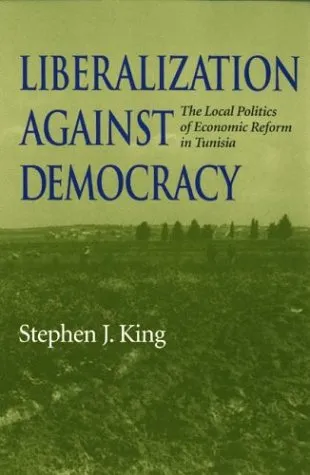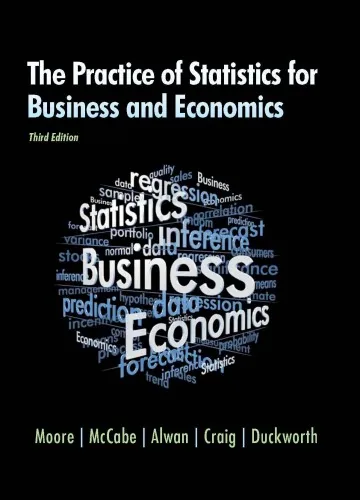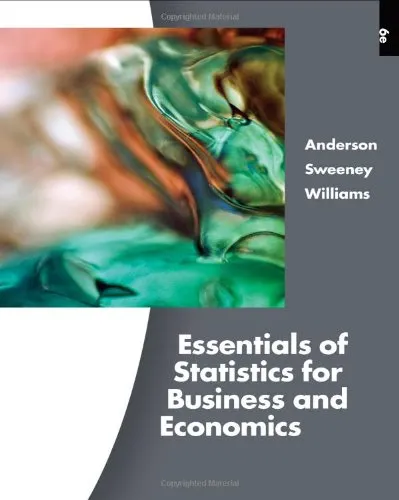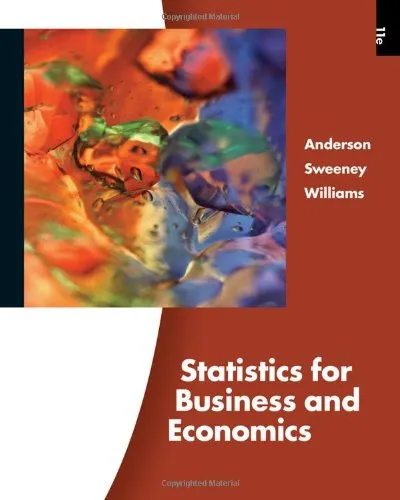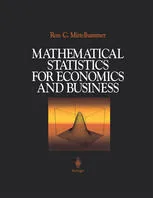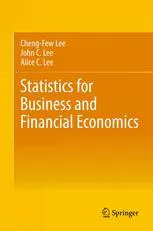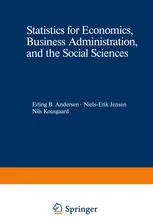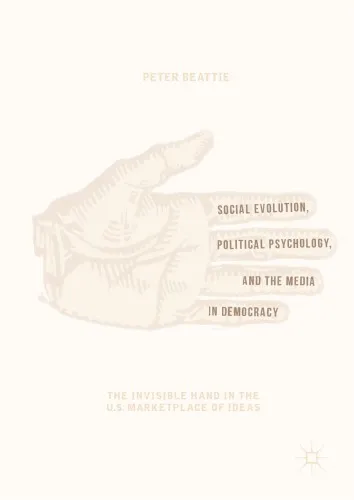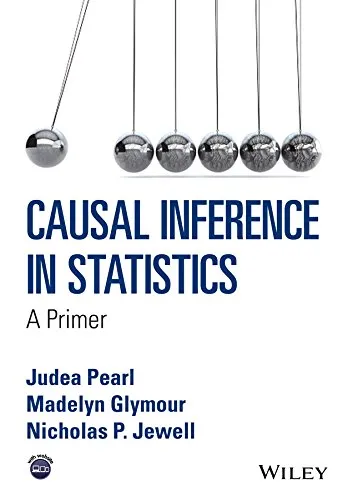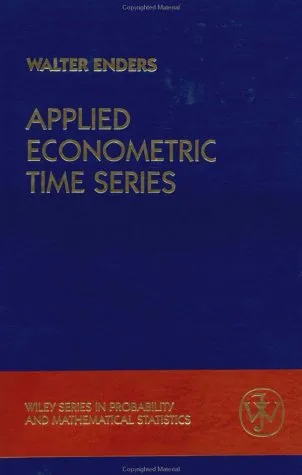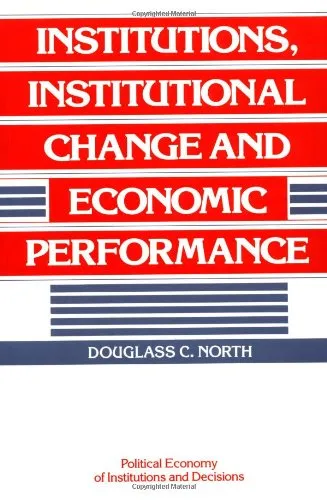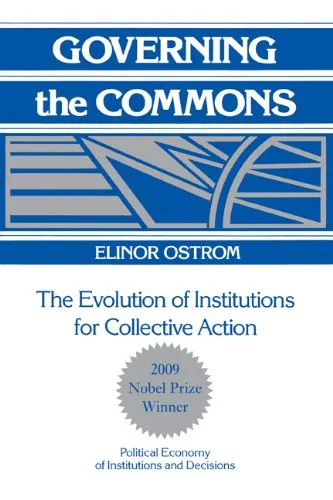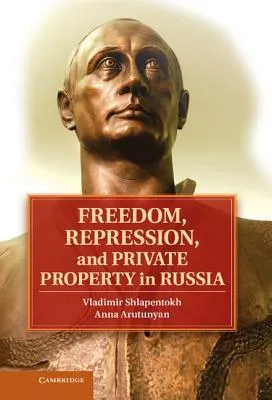Liberalization Against Democracy: The Local Politics of Economic Reform in Tunisia (Middle East Studies)
4.0
بر اساس نظر کاربران

شما میتونید سوالاتتون در باره کتاب رو از هوش مصنوعیش بعد از ورود بپرسید
هر دانلود یا پرسش از هوش مصنوعی 2 امتیاز لازم دارد، برای بدست آوردن امتیاز رایگان، به صفحه ی راهنمای امتیازات سر بزنید و یک سری کار ارزشمند انجام بدینکتاب های مرتبط:
معرفی کتاب "Liberalization Against Democracy: The Local Politics of Economic Reform in Tunisia"
کتاب "Liberalization Against Democracy: The Local Politics of Economic Reform in Tunisia" نوشته استیفن جی کینگ یکی از مهمترین آثار در حوزه مطالعات سیاسی و اقتصادی خاورمیانه است. این اثر بهطور خاص به بررسی سیاستهای اصلاحات اقتصادی در تونس و تأثیر این اصلاحات بر فرایندهای دموکراتیک در این کشور میپردازد. نویسنده با استفاده از رویکردی عمیق و علمی نشان میدهد که چگونه فرآیند لیبرالیزاسیون اقتصادی میتواند به کاهش دموکراسی بینجامد و ثبات سیاسی را به چالش بکشد.
خلاصهای جامع از کتاب
این کتاب بهطور خاص محورها و موضوعات مرتبط با پیادهسازی سیاستهای تعدیل ساختاری و تأثیر آن بر روابط میان حکومت و مردم در تونس بررسی میکند. نویسنده نشان میدهد که سیاستهای اقتصادی تحت نظارت International Monetary Fund و World Bank چگونه بر روابط سیاسی و پویاییهای اجتماعی تأثیرگذار بودهاند. او معتقد است که اجرای این اصلاحات در کشورهای در حال توسعه مانند تونس ممکن است به جای دموکراسیسازی، موجب تقویت رژیمهای اقتدارگرا شود.
استیفن جی کینگ این تحلیل را با توجه به تغییرات محلی و سیاستهای داخلی تونس انجام میدهد و نه تنها بر سیاستهای رسمی دولت، که بر تأثیرات آن بر زندگی روزمره مردم نیز تمرکز دارد. او استدلال میکند که رهبران سیاسی تونس از اصلاحات اقتصادی بهعنوان ابزاری برای تحکیم قدرت خود و مهار فشارهای داخلی بر آزادیهای سیاسی استفاده کردهاند.
نکات کلیدی از کتاب
- رابطه پیچیده بین اصلاحات اقتصادی و فرایندهای دموکراتیک.
- نقش نهادهای مالی بینالمللی در سیاستگذاری کشورهای در حال توسعه.
- بررسی تاثیرات لیبرالیزاسیون اقتصادی بر حکومتهای اقتدارگرا.
- تحلیل محلی و عمیق از تأثیر اقدامات اقتصادی دولت تونس بر طبقه کارگر.
- نشاندادن چگونگی مقابله جامعه مدنی تونس با فشارهای اقتصادی و سیاسی.
جملات معروف از کتاب
"While economic liberalization may promise growth, it can often undermine political democratization in authoritarian states."
"In Tunisia, economic reform was less a process of modernization than a mechanism of political control."
چرا این کتاب مهم است؟
این کتاب یکی از بهترین منابع برای درک تعارضات بین توسعه اقتصادی و فرایندهای دموکراتیک است. با تمرکز بر تونس بهعنوان یک مورد مطالعاتی، استیفن جی کینگ توانسته است درک عمیقی از چالشهایی که کشورهای در حال توسعه با آنها روبرو هستند ارائه دهد. این اثر به محققان، دانشجویان و سیاستمدارانی که علاقهمند به روابط بین اصلاحات اقتصادی و سیاستهای دموکراتیک هستند، توصیه میشود. همچنین، برای کسانی که به خاورمیانه و تحولات جاری در این منطقه توجه دارند، این کتاب یک مرجع حیاتی و آموزنده خواهد بود.
اهمیت دیگر کتاب در توانایی آن برای برجسته کردن شکاف میان نظریه و عمل در فرآیندهای تعدیل ساختاری و دموکراسیسازی است. نویسنده بهطور موشکافانه نشان میدهد که چگونه سیاستهای به ظاهر بیطرف اقتصادی، در عمل میتوانند به ابزار سیاسی برای سرکوب معترضان و مخالفان تبدیل شوند.
Introduction to "Liberalization Against Democracy: The Local Politics of Economic Reform in Tunisia"
Stephen J. King’s landmark book, Liberalization Against Democracy: The Local Politics of Economic Reform in Tunisia, offers a compelling exploration of the intersection between economic liberalization and political dynamics in the Middle East, with Tunisia as a central case study. The book neither romanticizes economic reforms nor dismisses them outright but instead investigates how these reforms interact with local political systems, often undermining the very prospects for democratization they are expected to foster. This scholarly yet accessible work is essential for understanding not only Tunisia's historical trajectory but also broader patterns prevalent in developing nations undergoing similar transformations.
Detailed Summary of the Book
The central premise of King’s book is that neoliberal economic reforms, often championed by international financial institutions like the International Monetary Fund (IMF) and the World Bank, do not necessarily lead to democratic outcomes. Instead, in many contexts, such reforms strengthen authoritarian regimes. By focusing on Tunisia, King examines how structural adjustment programs implemented in the 1980s and 1990s served to consolidate authoritarian rule. The reforms in question required governments to cut subsidies, privatize state-owned industries, and liberalize trade. While intended to stimulate economic efficiency, such policies often upset existing social contracts, particularly in countries like Tunisia, where the state traditionally controlled economic opportunities.
King carefully analyzes how Tunisia’s authoritarian leadership used economic liberalization to reorganize local power dynamics. Far from limiting the power of the state, structural adjustment programs became a tool for the regime to consolidate its grip on resources, co-opt local elites, and suppress dissenting voices. One of the book’s most striking insights is how economic reform policies cemented a system of patronage politics. The central government selectively allocated economic benefits to local elites, ensuring their loyalty while marginalizing actors who could challenge the status quo.
King does not stop with economic liberalization alone. He contextualizes these reforms within a broader set of international and domestic pressures, illustrating how the Tunisian case fits into global patterns. The book argues that the local political microcontext plays a decisive role in determining whether neoliberal reforms strengthen or weaken democratic institutions. Tunisia's experience highlights the paradox: although international donors aim for both economic and democratic development, their policies often achieve the opposite.
Key Takeaways
- The universal application of neoliberal economic reforms often has unintended political consequences, particularly in authoritarian states.
- Tunisia’s regime adeptly used economic liberalization to consolidate local political control rather than democratize.
- Economic reforms can exacerbate social inequality, creating fertile ground for political exclusion rather than inclusion.
- International financial institutions must consider the local political context before recommending uniform economic policy prescriptions.
- The interaction between global donors and national governments requires careful calibration to align goals of democratization and economic reform.
Famous Quotes from the Book
"Economic liberalization, far from dismantling authoritarian structures, often feeds into their persistence by creating new patterns of dependence and cooptation."
"The paradox of reform is this: the policies prescribed to foster democracy can inadvertently deepen repression when filtered through authoritarian regimes."
"Local politics is where the grand narrative of economic reform meets the lived reality of citizens. In Tunisia, this meeting revealed the limits of externally imposed models of change."
Why This Book Matters
Stephen J. King's Liberalization Against Democracy is not just a case study on Tunisia; it is a lens through which we can examine the broader relationship between economic policies and political systems in the Global South. The book is particularly relevant today as more countries in Africa, the Middle East, and beyond grapple with similar challenges. Policymakers, academics, and activists seeking to promote both development and democracy will find King’s work a sobering yet enlightening read.
Understanding why economic liberalization often fails to democratize society offers critical lessons for ongoing efforts in global governance. The insights presented in this book are urgent and essential as the international community continues to promote economic reforms in countries with varying political traditions. King’s work reminds us that there are no one-size-fits-all solutions in social and political transformation, and any intervention must factor in the intricate dance between state, society, and economy.
دانلود رایگان مستقیم
شما میتونید سوالاتتون در باره کتاب رو از هوش مصنوعیش بعد از ورود بپرسید
دسترسی به کتابها از طریق پلتفرمهای قانونی و کتابخانههای عمومی نه تنها از حقوق نویسندگان و ناشران حمایت میکند، بلکه به پایداری فرهنگ کتابخوانی نیز کمک میرساند. پیش از دانلود، لحظهای به بررسی این گزینهها فکر کنید.
این کتاب رو در پلتفرم های دیگه ببینید
WorldCat به شما کمک میکنه تا کتاب ها رو در کتابخانه های سراسر دنیا پیدا کنید
امتیازها، نظرات تخصصی و صحبت ها درباره کتاب را در Goodreads ببینید
کتابهای کمیاب یا دست دوم را در AbeBooks پیدا کنید و بخرید
1403
بازدید4.0
امتیاز0
نظر98%
رضایتنظرات:
4.0
بر اساس 0 نظر کاربران
Questions & Answers
Ask questions about this book or help others by answering
No questions yet. Be the first to ask!
